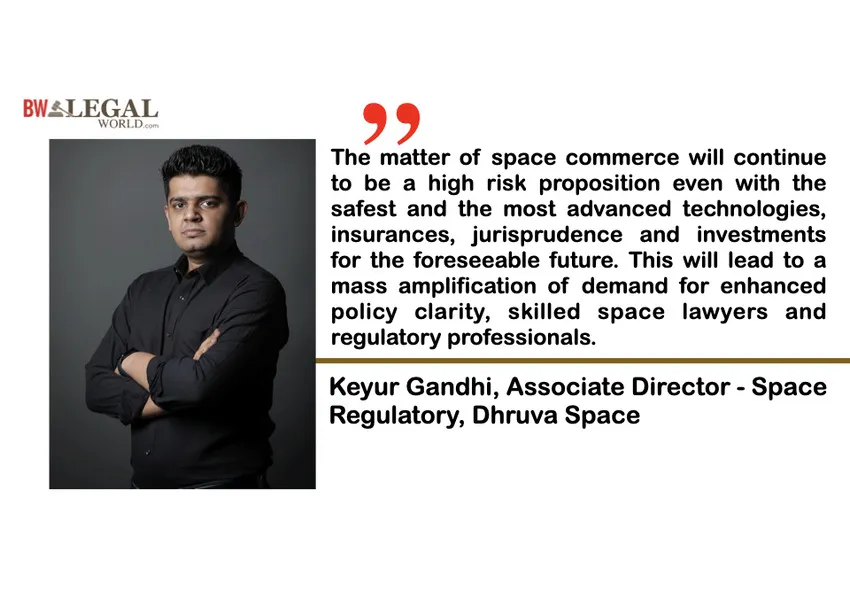BW Online Bureau | April 28, 2024
In an insightful conversation with BW Legal World, Keyur Gandhi discusses space policy and his multifaceted role spanning legal, regulatory, and business development at Dhruva Space.
What inspired you to pursue a career in law?
I can’t pinpoint exactly when my fascination with law turned into a firm career choice, but it happened, making me the first lawyer in my family. At 10, I was captivated by stories involving courtrooms, whether from novels, dramas, or films. Though my understanding was limited back then, the allure of the legal profession was undeniable.
During my school years, I was surrounded by supportive teachers, friends, and mentors who encouraged me to explore beyond academics. This curiosity fueled my deeper dive into all things related to law. As I learned more, I realized how dynamic the profession is—touching on criminal, constitutional, labor, and intellectual property laws. With law, I saw opportunities in policy-making, litigation, management, risk, finance, and more.
When it came time to choose my degree, it was clear that law was the path for me—one that would let me explore a wide range of subjects without strict boundaries. Becoming a lawyer felt like an obvious and exciting choice.
What are your responsibilities as Associate Director – Space Regulatory at Dhruva Space?
I joined Dhruva Space in 2021 during an exciting period when the Space Policy, the formation of IN-SPACe (the space regulator), and Dhruva Space’s first mission were all taking shape. The company, housed in a 3,600-square-foot office in Hyderabad, was at a pivotal stage of strategic growth, and I knew from my first day that it was the right place for me.
Initially, I handled a mix of legal, regulatory, and business development tasks, closely supporting the CEO. Today, my role can be divided into two main areas:
- Regulation & Policy: I focus on solving regulatory challenges, ensuring compliance, and leading policy efforts to create favorable market conditions for Dhruva Space and the wider space industry. This involves working across various teams—from engineering to procurement—and no two days are alike.
- Key Responsibilities:
- Policy Advocacy: I work on domestic and global policy initiatives, helping target markets be regulatory-ready in collaboration with government stakeholders and industry forums. This is crucial as space regulation evolves across jurisdictions.
- Regulatory & Risk Management: I manage space mission regulations, including spectrum coordination, licensing, and trade controls. This requires liaising with government bodies from the space, telecom, defense, trade, and security sectors.
- Internal Frameworks: I’m responsible for building internal systems to manage legal, regulatory, and commercial risks—a significant challenge given the startup environment and the lack of established precedents.
- Commercial Strategy: I advise on public procurements, contracts, and intellectual property. I also work closely with the CEO on commercial and partnership strategies, helping drive Dhruva’s growth in terms of revenue, scalability, and reputation.
How do you see the future of space law evolving?
The field of space law is evolving, heavily influenced by defense considerations both nationally and internationally. Many countries are transitioning to commercial space economies, moving away from the “global space race” era toward civil space applications that improve life on Earth and beyond.
Despite advancements, space commerce will continue to carry high risks, even with the most advanced technologies and legal frameworks. This will increase the demand for skilled space lawyers, regulatory clarity, and enhanced policy frameworks.
Globally, both developed and developing nations are committed to adopting space technologies and fostering international cooperation in civil space endeavors. By the end of the 2020s, I expect to see space law in India and other emerging nations develop into more defined frameworks with clear guidelines and regulations. However, we are still several years away from significant litigation that challenges the core tenets of space law.
What advice do you have for aspiring space lawyers?
I became a space lawyer by chance, shortly after graduating with a specialization in business law. Today, there are limited academic opportunities to specialize in space law due to the lack of jurisprudence since the Outer Space Treaty.
To succeed in space commerce, it’s essential to build expertise in areas like strategic trade controls, spectrum management, public procurement, and international trade laws.
Success in space law won’t come quickly due to the scarcity of mentors and the secretive nature of the sector. My advice is:
- Develop a strong understanding of legal and regulatory frameworks.
- Invest time in understanding the space business and its value chains.
- Be prepared to fail and learn every day.
- Avoid comparing your journey to others in the legal industry.




